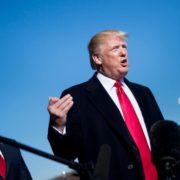WH to announce pathway to citizenship for undocumented youth as DACA negotiations underway
At a time where major policy developments seem to occur daily in Washington, this week brought about particularly significant moves in the ongoing immigration battle.
On Wednesday, January 24, President Donald Trump unexpectedly voiced his support for a pathway to citizenship for undocumented youth, saying that he’d allow DREAMers to “morph into” citizens over time.
“Over a period of 10 to 12 years,” the president told reporters at the White House on Wednesday. “Somebody does a great job, they work hard — that gives incentive to do a great job. Whatever they’re doing, if they do a great job, I think it’s a nice thing to have the incentive of, after a period of years, being able to become a citizen.”
Encouraging Congress to put together a legislative solution for DREAMers, Trump said the only way he’ll support the bill is if it also includes confirmation of the massive wall along the controversial United States-Mexico border, his long-awaited plan he touted often on the campaign trail.
The president offered no details past his vague support, but the following morning on Thursday, the White House sent an email that warned of a massive influx of immigrants and called for an end of family-based immigration sponsorship, derogatorily known as “chain migration.”
White House Press Secretary Sarah Sanders expanded on the administration’s plans to move forward with the DACA solution that includes the border wall.
“The White House will release a legislative framework on Monday that represents a compromise that members of both parties can support. We encourage the Senate to bring it to the floor,” Sanders told the press corps at a White House press briefing on Wednesday.
White House releases details on immigration reform
Following up on Trump’s and Sanders’s remarks, the White House released a memo Thursday night detailing suggested framework on reforming the immigration system by closing “legal loopholes that are exploited by smugglers, traffickers, cartels, criminals and terrorists.”
The framework calls for a $25 billion trust fund for the U.S.-Mexico border wall, all ports of entry and improving the U.S.-Canada border. They also order the expansion of DHS and immigration personnel.
In addition to providing legal status to DACA recipients as well as another 1.1 million undocumented immigrants eligible for the program, the memo also calls to end family-based immigration channels, also known as chain migration. Though the memo didn’t explicitly list family-based programs it would slash, the Obama-era Filipino World War II Veterans Parole program reunited hundreds of families since it became effective in 2016.
In fact, many Filipino families reunite in the U.S. through family-based sponsorships; according to the Migration Policy Institute, about 30 percent of Filipino immigrants became lawful permanent residents (LPRs) through family sponsorship.
Moreover, more than half of the immediate relatives of U.S. citizens — spouses, children who are minors and parents — were able to come to the U.S. through family-sponsored programs.
The administration also plans to scrap the Diversity Visa Lottery, which was established in the 1990s to allow entry to immigrants hailing from countries with low rates of immigration to the United States.
As the president previously supported, the administration favors a more “merit-based” immigration system in which individuals must prove exceptional educational and career experience.
Partisan tensions increase
Although the border wall was the key sell for a DACA fix for the administration, Senate Minority Leader Chuck Schumer (D-NY) withdrew the Democrats’ support for funding the border wall, bringing the immigration dialogue back to square one.
Previously, Schumer pledged to authorize upward of $20 billion to fund the border wall in exchange for protection for DREAMers, but this week, he made took back the offer, simply telling reporters, “The wall offer’s off the table.”
Schumer’s abrupt announcement resets negotiations when time is of the essence and Congress has less than two weeks to pass a federal spending bill. Despite outrage from the president via Twitter, Schumer remained untethered, saying on CNN, “We’re starting over.”
“Every Democrat — all forty-nine of us @SenateDems — supports DACA. Many of my Republican colleagues do as well. We certainly can find a bill that will get sixty votes here in the Senate,” Schumer said on Twitter, defending his decision to rescind the border wall offer. “#Dreamers have been trying so hard to become Americans. They came across the border when they were little, now they’re in our armed forces, our schools, our factories, our offices. To say allowing Dreamers to become Americans is ‘amnesty’ is nasty; protecting Dreamers is our moral obligation. The eyes of America are on us to help them, and we must get the job done.”
California Rep. Darrell Issa (R-San Diego) is the latest member of Congress to introduce a fix with his DACA Compromise Act, which would make visas available to DACA recipients.
Modeled after the Nicaraguan Adjustment and Central American Relief Act of 1997, Issa’s bill allows eligible DREAMers — who have been vetted by the Department of Homeland Security — allocates a certain amount of visas specifically for DACA beneficiaries. They would be granted legal permanent residency, a step up from the previously temporary status that DACA provided.
“Problems like these require innovative thinking and lawmakers from both sides of the aisle coming together, putting all their ideas on the table, and figuring out the best way to get the job done,” Issa said in a statement. “This is a simple common-sense fix that will guarantee certainty for the children of illegal immigrants who were brought here through no fault of their own and know no other home other than the United States. (Klarize Medenilla/AJPress)






